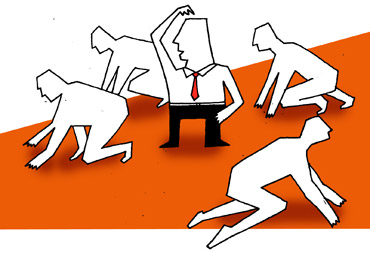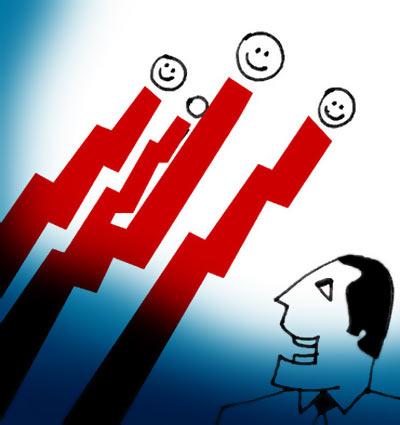
While some of these habits may work at the early stage, for those thinking of scaling up, these very attributes may bring your start-up down.
There's a plethora of success stories of mega corporations, on their genetic code and on how they operate. There's also a lot of glamorous coverage on start-ups and start-up leaders.
We hear of the best practices and management learning from successful large Enterprises, and we also have a plenty of advice for the Start-up leaders.
However, the fact remains that only a miniscule number of all promising start-ups actually break-through to the big league. And for those who do, the script of their painful and paradoxical journey is often oversimplified or just plain uncovered.
And one of the most important aspects of such successful transformations -- from a successful start-up to a mega-business -- lies in whether entrepreneurs are able to successfully transform the genetic code of the organisation.
Entrepreneurs and start-up leaders that are successful in the jump-start phase are so because of certain effective habits that they either have or have developed during the initial phase. However, the same habits, if carried forward too long become counter-productive to scale for their business.
The main reason being that once the business is off the ground, it's not about the entrepreneur any more, but about the engine that propels the business.
Also, entrepreneurs may find it harder to adapt because of the early successes. It's tempting to think that the same characteristics that brought them a string of successes can continue to play their part as the business grows. And unfortunately, they cannot just bring in a new leadership to take over and do this for them.
They have to start with themselves -- precisely for the tremendous zeal with which they brought the organisation to where it is -- and, then infuse new leadership accordingly if needed.
Let's look at some of such habits, why they are great for start-up and how they become counter-productive for scaling.
Illustration: Dominic Xavier

Please click NEXT to continue reading...

Entrepreneurs are adept at figuring complex situations out, and to find simplistic "anything that works" solutions to keep going through the grind of early stages.
That is one trait that's critical early on when one has to contend with perennial set of challenges with minimal resources.
However, this tendency, over time has to give way to intellectual freedom for others in the organisation and also a more systematic set of problem solving techniques for the organisation to scale.
Consistency and Repeatability are important for scaling organisations.
The ability to simplify the complex situations is a great trait in general.However, as the growth requirements demands scaling up, business faces more complex problems posed by variety of employees and customers across the spectrum.
A process and systems driven approach is called for, and while that doesn't have to yield to a more cumbersome and rigid process driven organisation, still a more structured approach to handling the commonly confronted situations is required so that people at various tiers can operate on their own at operational level.
Hence, the "Jugaad" tendencies have to give way to more structured operations.
Illustration: Uttam Ghosh

Successful entrepreneurs are masters at adapting on the fly.
Early on, this is important because most times the foundations of the business are not validated with the real markets and real customers.
Ability to change the direction as required by the market is important in the early stages, even at strategic level.
This "Pivoting" is becoming even more critical in the fast paced technology environment, especially in the consumer markets where one cannot always be sure of the right combination of the product, pricing, positioning and promotional approaches.
This dynamic thinking, earlier on, helps validate multiple hypotheses built into the business model. One pivots as fast as one can, and as often as one can, until a successful combination emerges or until one runs out of resources.
However, once the business model is validated and organisation is set to run in one direction, this tendency to shout the marching orders down the hall becomes unproductive because other leaders find it difficult to fall in line at the drop of the hat. This can get chaotic pretty quickly.
This argument against "too much agility", however, should not be confused with the agility required to be watchful in a fast paced environment, where an empowered team would be able to pinpoint a change in trends and be able to adapt quickly to changing business conditions.
The tendency that needs to be curbed is the one where the decisions are made at the drop of the hat without due consideration to how the organisation needs to change in short term as well as longer term in response to a changing situations on the ground.
And, more importantly, not to disrupt the process of building the operationally efficient organisation in the business that is on path to scale.
Illustration: Uttam Ghosh

An entrepreneur takes pride in taking the winning shot. It's not just the pride or ego, but a sense of duty and sense of right, mixed in one.
When the stakes are high, it's abnormal to think of delegating the authority (looked upon as responsibility).
However, this tendency gets deeply embedded in routine decisions. Unless a systematic transition to delegation and transfer of ownership happens, the organisation remains a single-cylinder engine.
A scaling organisation requires empowerment and that cannot come from "just assignment of responsibility" but through the "true delegation of authority and freedom to take important decisions".
However, what also happens is that by the time the realisation to build an empowered team strikes, the entrepreneurs find themselves surrounded by other leaders who are too habitual to take the orders and are unable to devise the strategy on their own.
It's not a matter of competency in most cases, but the way the business leaders get wired into working in a certain way, and looking up for directions.
They also get into a habit of kicking the issues and conflicts upstairs that makes the organisation slower to respond to urgencies on the ground.
Scaling organisations require the entrepreneurs to let go of the sense of control and ownership, and empower the team in true sense.
Illustration: Dominic Xavier

The initial thrust in business comes from the reputation and credibility of the entrepreneur.
This leads to a cycle of further boost of personal branding, further resulting into more business driven in such a manner and so on.
It very quickly reaches a point where the Business and the Entrepreneur become synonymous to each other.
While that is great initially, an organisation looking to scale into a mega-business needs to balance the company objectives against individual objectives earlier than later.
In other words, the leaders need to put the organisational goals ahead of personal goals.
Even as there is little doubt that success of the company is a passionate personal goal for start-up leaders, the way it happens most times is by putting their personal whims and fancies, and branding, in the back seat, and let the organisation harness the power of people at all levels. The earlier it is done the better.
Entrepreneurs that are more focused to the longer term scaling of the business need to ensure that the business or the product is branded explicitly with bigger intensity than the owners of the company.
I had earlier highlighted on this paradox of branding as one of the five paradoxes of successful product business.
And this remains one of the things that are difficult to fix quickly since branding takes time and change of stance in branding from personal to business is often tough unless done from the initial stages.
Illustration: Uttam Ghosh

An early stage of a start-up requires the leaders to juggle a lot of balls at once, making them a habitual juggler.
It's an invaluable trait to be able to juggle priorities, handle multiple things at ones across functions, to be able to venture into the unknowns and come out stronger.
Great start-ups are known to thrive on minimal resources and require the leaders to be able to act on multiple initiatives at the same time, almost to the point of craziness.
This, however, gets deeply embedded in the habitual code as "uneasiness" and "impatience" with anything that requires systematic and long-term sustained focus.
There develops a tendency to kick-off the new exciting projects on the periphery of the organisation, which is difficult to do without affecting the focus on core business.
Normally, operational leaders are appointed to sustain and expand the businesses that are doing well, which is fine but a scaling business also require the continuing focus of entrepreneurial mind in the core drivers of business.
Successful large organisations have spun-off multiple businesses, but they do it upon the successful scaling of the core business, not at the behest of the core.
Biting those bullets before the time comes is hazardous to the health of the business.
Illustration: Uttam Ghosh

Networking and relationships are the core strengths of a start-up business.
Focus on relationships gets the best out of the organisation in order to delight the first set of customers.
Early-on in the life of the organisation, relationships and personal networks play a critical role across all the areas of the business -- hiring, business acquisition, delivery, financing, marketing and PR, and so on.
On customers front, there are two sides to this coin. Acquisition of new business, as well as sustenance of existing business are driven through relationships, which helps because of the lack of early credentials and referencible successes.
The flip side is that these relationships tend to be personal relationships. The customers expect the leaders to show up at the drop of the hat.
It's not scalable for an entrepreneur to show the face and shake the hands at every opportunity to build new business or when there is fire at an existing one.
This needs to go beyond the leader at the helm.The organisation needs to go beyond personal relationships into professional customer oriented relationship mindset -- which is easier said than done once the organisation is already growing.
Similarly, entrepreneurs find it hard to confront the performance issues among employees and partners due to the personal and emotional connects that hold most of these relationships together.
These connections can quickly become a liability if the leaders (and hence organisation) lose the ability to make objective decisions in these relationships.
Illustration: Dominic Xavier

Entrepreneurs tend to demonstrate heroism, and inadvertently (or sometimes intentionally) promote heroism.
Start-ups are replete with stories of celebrated heroism -- single-handedly acquiring a new customer, heroically defusing an exploding customer situation, over nightly launching an offering, and so on.
Due to the nature of various functions, this heroism is found more in Sales, Marketing, and delivery of larger projects.
Sometimes, plain pure planning and preparation -- an aspect that gets often overlooked in a start-up scenario, also necessitate such heroism.
This is partially also acceptable to entrepreneurs because a start-up typically takes pride in informality (bordering on casualness unfortunately) and flat (or absent) structures.
Start-up leaders themselves set examples of heroism that over time plays down a systematic, well-planned bricklaying approach that a scalable business is built upon.
Many times, the heroism culture also inadvertently sabotages any chances of under-played sustainable success, because of the glamour and awards attached to such celebratory moments.
However, it has been proven that the most sustainable and scalable businesses are built by behind-the-scene bricklaying executioners.
It is important for entrepreneurs to make that transition in the genetic code of the organisation.
An emphasis on sustainable and repeatable success requires setting up the rewards and bonuses in line with a structured longer term approach, with due importance to the backend jobs in operations, deliveries and finances, while of course not losing sight of any heroics that really save the day in the true sense.
Illustration: Uttam Ghosh

It is obviously a matter of perspective.
The same traits that are huge leverage in one situation can be a liability in another. The point is not whether these traits are good or bad, per se, but to understand where they are effective and where they get counter-productive.
Business situations are often complex and it is difficult to pinpoint what is actually holding back the progress of a company.
Most start-ups, when faced with complex situations like this, look for help from outside -- in the form of funding, leadership talent, or even partnerships and exit plans.
However, it is also true that most successful mega-businesses crossed the chasm between the start-up phase and the maturity phase with the core entrepreneur/start-up team still at the helm.
While, upon introspection, some of these bottlenecks can be identified, it is difficult to ascertain how much impact some of these habits have on the overall results.
However, it is safe to say that recognition of these and an attempt to consciously look at the transition can only help. Happy scaling!!